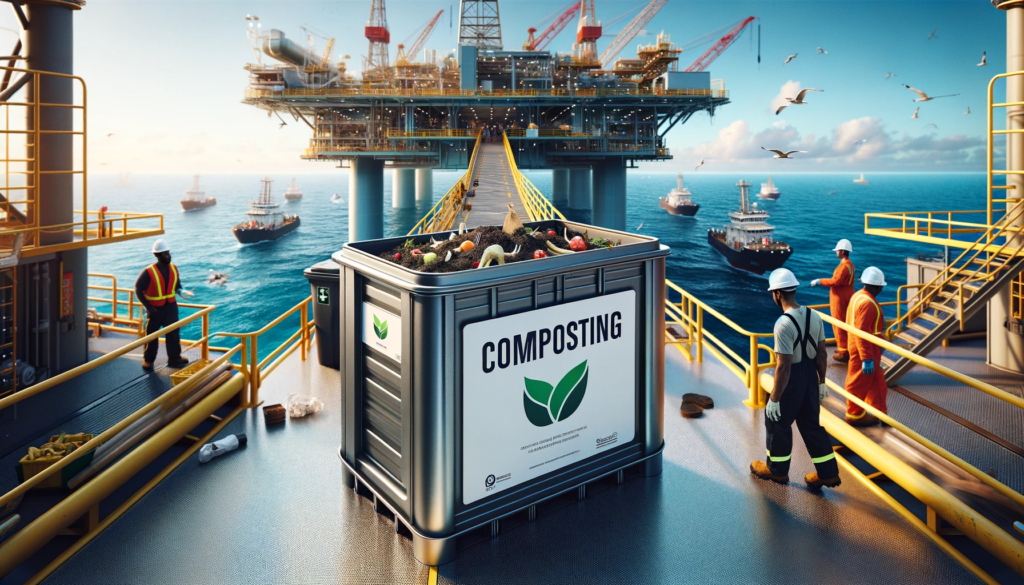Eco-Oil Rig? How Trinidad’s Offshore Giants Are Turning Waste into Soil!
In the heart of the Caribbean, amidst the deep blue waters off the coast of Trinidad and Tobago, an unexpected green initiative is taking place. It’s a story of innovation, sustainability, and the unlikely marriage of agriculture and the oil industry. Spearheaded by a local businessman and farmer operating Phillip’s Produce, this project is challenging the narrative of environmental stewardship by one of the world’s largest oil producers.
The Genesis of a Green Initiative
Phillips’s Produce discovered an open bid from a leading global oil producer, seeking innovative food waste composting solutions for their offshore rigs. This opportunity promised to challenge the status quo and promote sustainability, compelling Phillip Produce to engage.
A Brilliant Plan at Sea
Phillip’s recognized the potential of the BioSpeed composter, a state-of-the-art technology designed to accelerate the composting process. His vision was to deploy this technology on the oil rigs, transforming food waste into a valuable resource. The BioSpeed composter, known for its efficiency, would process the organic waste into a usable soil amendment, a commodity Phillip’s could utilize back on the company farm.
Multiple Benefits of the BioSpeed Composter
The benefits of Phillip’s plan extended beyond the mere recycling of food waste. By implementing the BioSpeed composter on the oil rigs, several other advantages emerged:
- Deterring Seabirds: The constant presence of seabirds, attracted by food waste, has been a nuisance for oil rig operations. The BioSpeed composter would significantly reduce this attractant, mitigating the issue of birds and their droppings on the rigs.
- Compliance with Sea Laws: Waste management at sea is governed by strict regulations. By processing the waste on-site, the oil rigs would not only comply with these laws but also set a new standard for environmental responsibility.
- Reduction of Food Waste: The BioSpeed technology promised to reduce food waste by an impressive 70-90%, minimizing the volume of waste transported back to land.
A Pilot Program with Promise
The first BioSpeed unit was introduced as a pilot program, set to run until June. This initial phase is critical, serving as a litmus test for the feasibility and impact of the initiative. Should the pilot prove successful, the oil company plans to expand the program to an additional 18 oil rigs off the coast of Trinidad.
The Irony of Sustainability on an Oil Rig
The juxtaposition of a sustainability initiative on an oil rig is not lost on observers. It’s an irony that highlights the complex relationship between industry and environmental stewardship. However, this initiative represents a significant step in the right direction. By embracing innovative solutions like the BioSpeed composter, the oil industry can play a crucial role in mitigating its environmental impact.
Taking Steps Towards a Greener Future
This groundbreaking initiative serves as a testament to the potential for sustainability in even the most unlikely places. It demonstrates that with innovation and commitment, strides can be made towards a more sustainable future, even within industries traditionally viewed as environmental adversaries.
(BioSpeed M1 by BioCoTech Americas)
Conclusion: A Symbol of Optimism.
The BioSpeed composting initiative off the coast of Trinidad and Tobago stands as a symbol of optimism. It showcases the potential for environmental stewardship within the oil industry and highlights the role of innovative solutions in addressing ecological challenges. As the world grapples with the dual imperatives of energy production and environmental conservation, initiatives like this offer a glimpse into a future where these objectives can coexist.
In the end, the success of this pilot program could herald a new era for the oil industry, one where sustainability is not just a buzzword but a fundamental aspect of operations. As Philip’s Produce and their partners await the results of the pilot, the stakeholders watch, hopeful for a positive outcome that could set a precedent for oil rigs around the globe.
